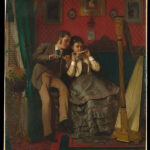We all have those songs that instantly transport us back to childhood, evoke carefree memories, or just get stuck in our heads for days. For many, “The Lion Sleeps Tonight” by The Tokens is undoubtedly one of those tunes. Its catchy “a-weema-weh” chorus and playful melody make it seem like a lighthearted song about a sleepy lion, perfect for sing-alongs and feel-good moments. I certainly thought so, happily belting it out in my friend’s car the other night, freshly inspired by a university discussion on postcolonial literature. But then, a nagging thought crept in – was there more to this seemingly innocent song than meets the ear? A quick dive into its history revealed a story far more complex, and frankly, disturbing, than I ever imagined, forcing me to confront uncomfortable truths about cultural appropriation and the hidden costs behind even the most beloved pieces of pop culture.
It turns out, “The Lion Sleeps Tonight” we know and love is not the original song at all. Its roots trace back to a 1939 Zulu song titled “Mbube,” meaning “lion.” Written by Solomon Linda, a South African singer and songwriter, “Mbube” wasn’t about a drowsy animal. Instead, it depicted a vivid scene from Linda’s childhood, herding cattle and trying to ward off lions. The now-famous “a-weema-weh” is actually derived from the Zulu phrase “uyimbube,” which translates to “you are a lion.” You can listen to the original powerful and resonant “Mbube” here: Original Mbube Song.
The story takes a dark turn under the shadow of Apartheid in South Africa. This oppressive regime severely limited the rights of Black people, including their economic and creative freedoms. Despite “Mbube” becoming a hit, selling around 100,000 copies, Solomon Linda sold the rights to his song to a recording company in 1948, the very year Apartheid officially began, for a mere pittance – reportedly less than two dollars. Tragically, Solomon Linda died in poverty in 1962, just a year after The Tokens released their hugely successful, Westernized version of “Mbube” as “The Lion Sleeps Tonight.” While The Tokens and various entities made fortunes from the song, Solomon Linda and his family saw none of the financial benefits and received no credit for his composition for decades. It wasn’t until 2006, after years of legal battles, that Linda’s family was finally granted a fraction – 25% – of the song’s royalties, as detailed in this NPR report: NPR Article on Royalties.
This history throws a stark light on the issue of postcolonialism and cultural appropriation. Apartheid itself was a direct consequence of colonial history, with European powers, particularly the Dutch and British, colonizing South Africa and imposing their cultural and social structures. As scholar Ania Loomba points out, the term “postcolonial” doesn’t truly apply to those still marginalized and economically exploited due to the legacies of colonization. Solomon Linda’s story is a perfect example. His creative work, deeply rooted in his culture and experiences, was taken, repackaged, and profited from by a Western group, while he and his community were denied recognition and fair compensation under a system built on racial and economic inequality.
While The Tokens’ version isn’t inherently “bad,” it undeniably represents a form of cultural appropriation. It’s a prime example of how intellectual property and cultural expressions are often taken from marginalized communities, reworked for mainstream consumption, and generate wealth for corporations and individuals in dominant cultures, a process that can be seen as a form of “capitalist imperialism.” This isn’t just a historical issue from the 1960s. We see similar patterns today, even in viral internet phenomena. Think about figures like the “Cash Me Outside” girl – often, online trends originating from marginalized communities are quickly commodified and exploited, often without benefit to the original creators or communities.
The story of “The Lion Sleeps Tonight” serves as a powerful reminder to look beyond the surface of our favorite songs and media. It urges us to be critically aware of the origins of cultural products we consume and to recognize the potential for exploitation and appropriation embedded within them. Perhaps next time you hear “The Lion Sleeps Tonight,” you’ll remember Solomon Linda and the complex history behind the catchy tune, prompting a deeper reflection on cultural exchange, ownership, and justice in our interconnected world.


